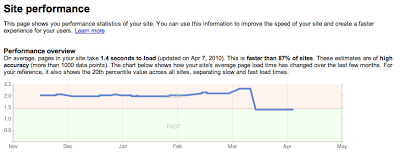Site speed is now a ranking factor in Google’s algorithm, and is already in place for U.S. searchers. But Google also cautions web site owners not to sacrifice relevance in the name of faster web pages, and even says this new ranking factor will impact very few queries.
Why Page Speed Matters
The first warning that site speed was on Google’s radar came last November, when Cutts said there was “strong lobbying” inside Google to account for site speed as a new ranking factor. Speaking at SMX West last month, Google’s Maile Ohye showed a slide indicating that delays of under a half-second impact business metrics.
In addition to the numerous studies over the years that show Internet users prefer fast pages, Singhal says Google ran its own testing on how users respond to page speed, including experiments on Google.com. Singhal and Cutts point to a June 2009 blog post on the Google Research Blog that talked about how Google purposely slowed down its search results to measure the impact on search behavior.
Our experiments demonstrate that slowing down the search results page by 100 to 400 milliseconds has a measurable impact on the number of searches per user of -0.2% to -0.6% (averaged over four or six weeks depending on the experiment). That’s 0.2% to 0.6% fewer searches for changes under half a second!
“When we slow our own users down [on Google.com], we see less engagement,” Singhal says. “Users love fast sites. A faster web is a good thing all around.”
How Google Measures Page Speed?
Singhal says there are two primary ways Google will measure page speed:
- How a page responds to Googlebot
- Load time as measured by the Google Toolbar
Where Page Speed Fits in Google’s Algorithm
Google’s algorithm has about 200 different ranking factors, and even though Google is taking the unusual step of publicly announcing a new factor, Cutts says site owners shouldn’t overestimate the impact of page speed on rankings.
“Quality should still be the first and foremost concern [for site owners],” Cutts says. “This change affects outliers; we estimate that fewer than 1% of queries will be impacted. If you’re the best resource, you’ll probably still come up.”
Singhal says the focus remains on improving the user experience on Google.com, and the company can’t do that if it gets the relevance of search results wrong. “We want to return faster sites,” he says, “but not at the expense of relevance.”
Using site speed in web search ranking (GOOGLE BLOG)
You may have heard that here at Google we’re obsessed with speed, in our products and on the web. As part of that effort, today we’re including a new signal in our search ranking algorithms: site speed. Site speed reflects how quickly a website responds to web requests.
Speeding up websites is important — not just to site owners, but to all Internet users. Faster sites create happy users and we’ve seen in our internal studies that when a site responds slowly, visitors spend less time there. But faster sites don’t just improve user experience; recent data shows that improving site speed also reduces operating costs. Like us, our users place a lot of value in speed — that’s why we’ve decided to take site speed into account in our search rankings. We use a variety of sources to determine the speed of a site relative to other sites.
If you are a site owner, webmaster or a web author, here are some free tools that you can use to evaluate the speed of your site:
- Page Speed, an open source Firefox/Firebug add-on that evaluates the performance of web pages and gives suggestions for improvement.
- YSlow, a free tool from Yahoo! that suggests ways to improve website speed.
- WebPagetest shows a waterfall view of your pages’ load performance plus an optimization checklist.
- In Webmaster Tools, Labs > Site Performance shows the speed of your website as experienced by users around the world as in the chart below. We’ve also blogged about site performance.

- Many other tools on code.google.com/speed.
While site speed is a new signal, it doesn’t carry as much weight as the relevance of a page. Currently, fewer than 1% of search queries are affected by the site speed signal in our implementation and the signal for site speed only applies for visitors searching in English on Google.com at this point. We launched this change a few weeks back after rigorous testing. If you haven’t seen much change to your site rankings, then this site speed change possibly did not impact your site.
We encourage you to start looking at your site’s speed (the tools above provide a great starting point) — not only to improve your ranking in search engines, but also to improve everyone’s experience on the Internet.
Final Thoughts
Page speed is in place now as a ranking factor on Google.com, and has been for a couple weeks. If your site was going to be impacted, it probably would’ve happened already. Google plans to monitor the results of this change and eventually expand the use of page speed as a ranking factor in other countries.

Response to “Google Counts Site Speed As A Ranking Factor”